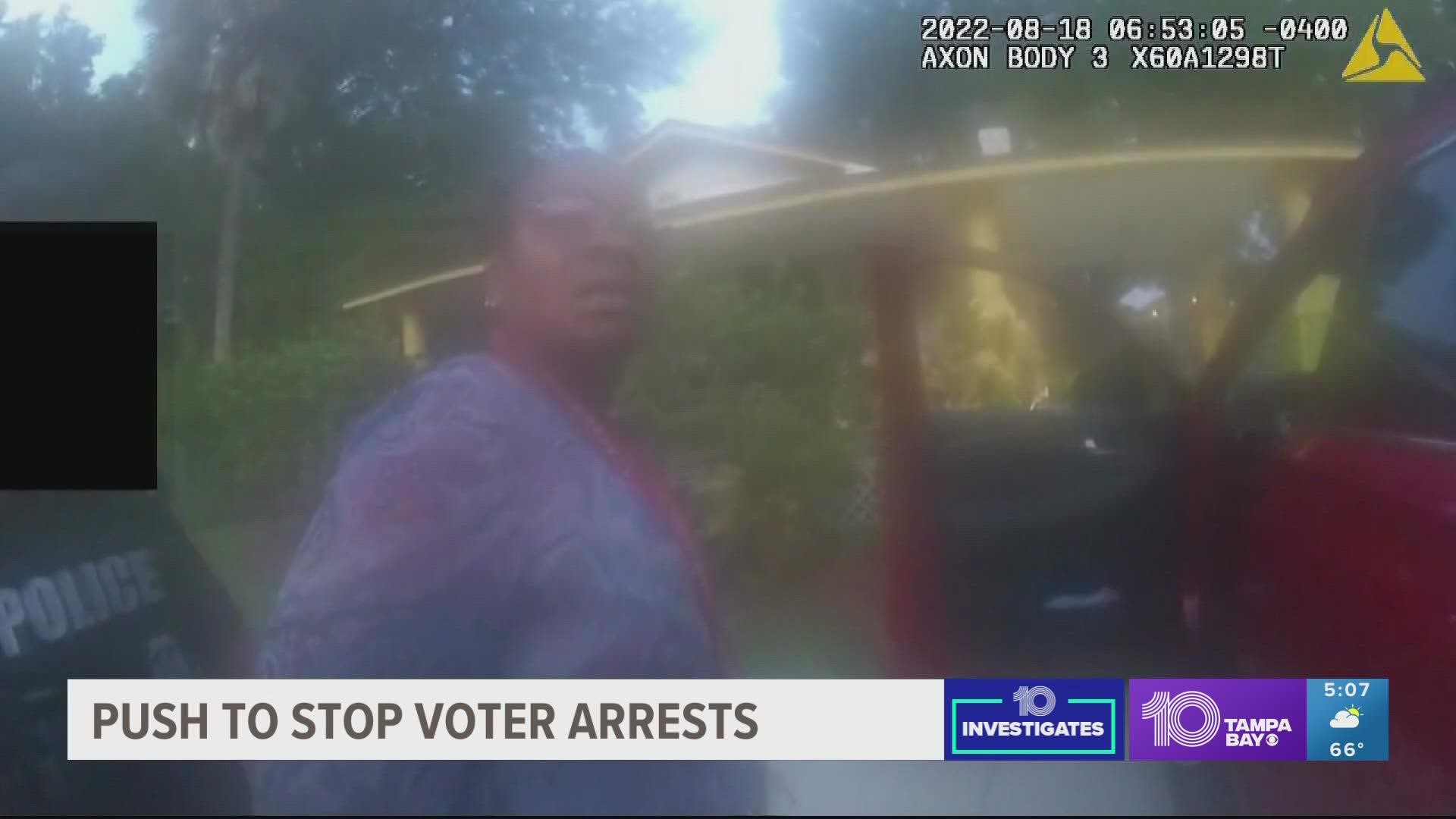TAMPA, Fla. — After arrest video capturing the disbelief of Hillsborough County residents facing voter fraud charges made national headlines, a new petition calls on the state to create a voter eligibility database and to stop arresting those with felony convictions who may have been led to believe by they could vote.
"The system's broken on the front end,” said Neil Volz of the Florida Rights Restoration Coalition.
The FRRC spoke publicly Wednesday, one day after bodycam video showed the Florida Department of Law Enforcement and local police arresting Hillsborough County residents with prior felony convictions and taking them to jail for voting in the 2020 election.
“Why would y’all let me vote if I wasn’t able to vote?” Tony Patterson asked an arresting officer.
FDLE and the Florida Office of Election Crimes and Security led the investigations that resulted in the 20 statewide arrests. Six of those arrests were in Hillsborough County. Florida law prohibits convicted murderers and felony sex offenders from voting, despite recent efforts to restore voting rights to those with felony convictions under Amendment 4.
However, some of the 20 apprehended in the statewide Aug. 18 arrest operation said they believed they could vote because they were able to register and received registration cards from the local Supervisor of Elections office.
One man said a worker at the DMV told him if he got a registration card, he could vote.
He did.
It landed him in handcuffs.
Volz says these examples represent loopholes in the system the state needs to fix.
“If like in other states, we had immediate verification process, then none of this would have happened,” Volz told 10 Investigates in a Wednesday interview. “Nobody would have been arrested, we wouldn't have had to spend all this money on law enforcement and the courts and seeing the pain of our fellow citizens in this process."
The new FRRC petition calls for the state to create a “centralized voter eligibility database to verify all voters by the end of 2023.”
"We could have an immediate verification process like they do in other states, and somebody could know that they're eligible when they get their voter ID card, which is what people think when they get a voter ID card from the state–that they're an eligible voter,” he said.
Volz, who himself has a prior felony conviction, says he hopes lawmakers will act immediately.
“We need to fight for people, and we need to fight for our elections because that’s the backbone of our society and that’s what I dedicate my life to,” he said. “And I saw that come about when I lost my right to vote and realized just exactly how I felt in that process.”
Gov. Ron DeSantis said the day of the arrests that those who voted despite their ineligibility must pay for their actions.
“They did not go through any process," DeSantis said on Aug.18. "They did not get their rights restored, and yet, they went ahead and voted anyways. That is against the law.”
Mark Ard, a spokesperson for the Florida Department of State, which oversees the Division of Elections, reiterated DeSantis’ stance in a statement to 10 Investigates.
“The individuals who were arrested for election crimes are felons convicted of murder or sexual offenses who are, by virtue of their crimes, ineligible to vote absent clemency. The ultimate responsibility to ensure compliance with the law lies with the voter, as local and state election officials are obliged to take the word of the voter on the voter application – affirmations made under penalty of perjury.
This includes marking a box affirming that “the applicant has not been convicted of a felony, or that, if convicted, has had his or her voting rights restored.” At this point, by law, the local supervisor’s office must send voting information and voter registration documents to the applicant as a standard procedure in response to the voter’s testament of eligibility. This action does not indicate permission to vote for an individual who has obtained a voter card under false pretenses.”
Six of the 20 statewide arrests took place in Hillsborough County. Those cases are moving through the Thirteenth Judicial Circuit Court with hearings taking place over the next few weeks.
Emerald Morrow is an investigative reporter with 10 Tampa Bay. Like her on Facebook and follow her on Twitter. You can also email her at emorrow@10tampabay.com.

